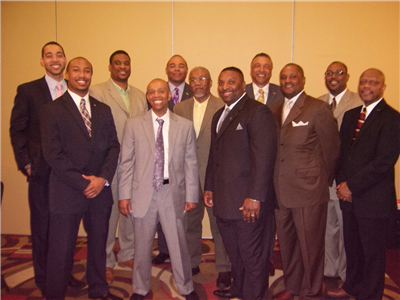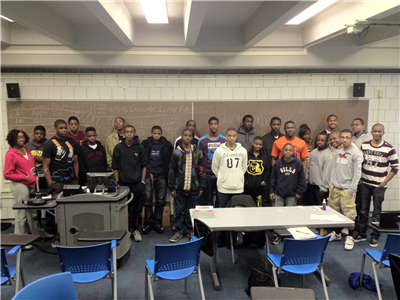
Ron Lawrence, President, 100 Black Men of Western Pennsylvania Inc.
Q&A with Ron Lawrence
By Carmen J. Lee
Endowments Communications Officer
The 100 Black Men of Western Pennsylvania Inc. continues to broaden its commitment to the region’s youth, most recently exemplified by moving the organization’s mentoring program to Community College of Allegheny County’s Allegheny Campus. Ron Lawrence, the group’s president, explains explains how recent changes are designed to increase 100 Black Men’s impact on students involved in its programs.
Q: What has been your organization’s biggest triumph of the past year?
A: Successfully relocating our mentoring program to a college campus environment and upgrading our Financial Empowerment curriculum. The first reason for moving to CCAC was space. The second reason was a combination of things. We wanted to keep the program in the community, but we also wanted to give the students exposure to the campus environment. CCAC has two high-tech classrooms that we use while we only had one low-tech room in the previous location. In addition, we wanted to expand our program, and with the grant from The Heinz Endowments, we were able to increase the number of students and redirect our focus even more on financial literacy.
Q: What has been the biggest trial?
A: Supporting and helping one of our female mentees overcome a two-year stalking ordeal. We opened our program up to young women about 20 years ago, so we’ve had a co-ed environment for a long time. We did that because young ladies, as well as young men, need the support and help.
Being involved in the community and dealing with high-risk students, we’ve dealt with lots of different issues. In this particular instance, the young lady was one of our mentees, and when she finished high school, we supported her as we do all of our graduates. We give them scholarship money and follow them through their college careers, and they normally keep in touch with us by email. While this student was in school at the University of Michigan, she got involved with a young man, and she reached the point where she wanted to break off the relationship. He said no, and that started the whole thing. For a period of two years, he would follow her to Pittsburgh and everywhere. We worked with her and her father, and we were able to keep things under control enough that eventually he just backed away. We made sure that she didn’t come to any harm. That was our biggest concern, and we were able to work with her to make that happen.
Q: What issue or event has had the most impact – positive or negative – on your organization in the past year and how have you responded?
A: Our organization’s national chairman declared a “state of emergency” in education for African American males and requested that all chapters of the 100 Black Men of America double their efforts to make an impact on the community and, especially, on African American males in terms of education, which is our primary focus. In fact, over the years, we’ve brought in members of the National Society of Black Engineers from Carnegie Mellon University and the University of Pittsburgh to help with tutoring.
Our local response to the chairman’s declaration was a pledge to take on the challenge to increase our efforts and expand our impact in the community we serve.
Q: What new initiatives have been started?
A: In response to the national chairman’s call and with support from the Endowments’ African American Men and Boys Initiative, we relocated our program last September from the Hill House Association, where we resided for 15 years, to the CCAC Allegheny Campus on Pittsburgh’s North Shore. As I mentioned earlier, this enabled the expansion we needed and exposes our mentees to a college campus environment. We also have upgraded our curriculum and implemented a broader Financial Empowerment program in response to the Endowments’ initiative. Perhaps Dean Young could add a comment here.
David Young, associate dean of academic affairs: CCAC’s mission is to provide education to the community, and these are students from various communities, so we felt compelled to open our doors for whatever was necessary. We had the facilities, and we had the technology that 100 Black Men needed in order to expand. It’s a collaboration that’s been working from the beginning.
Q: As head of this organization, what goals do you have for it next year?
A: We want to continue to grow the program to 40 or 50 mentees and to expand our focus on financial literacy for our youth.
Q: So if your organization were a person, what type of personality would you say it had?
A: Motivator and education igniter.
Q: What’s one of the biggest misconceptions about your organization?
A: That we are a social organization. We’re a mentoring organization, and we mentor in education, culture, financial empowerment, and health and wellness. Those are all areas that are important to our community. Those are all areas that we are struggling within our community.
Q: Can you share a short story about an incident or event that illustrates the impact you believe your organization is having on your local community or the region?
A: We recently attended the annual NEED Dinner at the Wyndham Hotel, where two of our students received scholarships to further their post-secondary education. One student who received an award acknowledged in the banquet program that the 100 Black Men of Western Pennsylvania had been a positive force in his life and encouraged him to continue to pursue his dreams. He has been with us for all four years of high school. We had emphasized to him the importance of taking responsibility for his actions, focusing on his education and making sure he does the things he needs to do to continue to move ahead.
Q: Could you share a short story about an individual’s experience that captures what your organization is meant to be to the community?
A: When one mentee who had been with us for three years finally got the message – or saw the light – he became motivated to the point that his GPA went from 0.6 to 3.6 by the time he graduated from high school. At first, when his Dad bought him to the workshops every week, he would sit in a corner off to himself. Our approach was to work through osmosis. We would let him sit there as we went through our program, and he started to absorb the information. After he did that long enough, he gradually started paying attention and then participating. We saw his whole demeanor change. He epitomized our motto: “What they see is what they can be.”
But I also have to commend his father for seeing the need and continuing to bring him to the program because if it had been up to the young man, he wouldn’t have shown up. So we need the parents involved in this, too. One of our problems is getting parent participation. But even if the parents just meet us halfway, we’ll try to take the extra step. We’ll pick kids up, drop them off or whatever is needed to keep them motivated and interested in the program.




